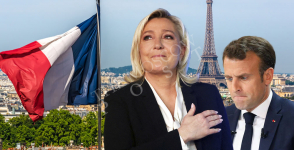Globalists and left-liberals are defeated in the parliamentary elections in France, Macron is in a panic, but a sharp change in policy on the Ukrainian issue should not b...

Last weekend, the first round of parliamentary elections ended in France. President Emmanuel Macron's political strength has been severely defeated. In the near future, France may face serious changes in both domestic and foreign policy - on the issue of assistance to Ukraine and confrontation with Russia.
Details - in the material of the correspondent of The Moscow Post.
The victory was won by Marine Le Pen's far-right National Rally (RN) party. According to the results published by the French Ministry of Internal Affairs, RN has 33.1% of the vote, while President Emmanuel Macron's party came only third with 20%. The second force in the republic was the left coalition "New Popular Front" (NFP) created before the elections - it has 28%.
Turnout was a record 66.7% in recent decades. A similar level of activity of French voters was last observed in 2002, when the turnout was 64.4%, and is comparable to that of 1997, when there were also early elections and the turnout in the first round was 67.9%.
Apparently, this is due to the political deadlock in which the current leadership of the globalists led France. Macron himself has repeatedly been associated with the influential Rothschild family and the infamous European "blue lobby," which also focuses on globalists in Washington, Berlin and Brussels.
It is already clear that despite the victory of the "National Association," the new government will in any case be a coalition. But there is still a second round ahead. The parties that lost the parliamentary elections in France hastily withdraw their candidates from the elections in order to prevent the National Association from winning an absolute victory in the second round. 173 candidates have already withdrawn from the elections - 122 recalls of candidates from the left, 50 from the presidential coalition and 1 from the Republicans.
President Emmanuel Macron himself called for "democratic and republican unification in the second round" against Marine Le Pen's party.
In some constituencies, the elections ended in the first round. The overwhelming majority of votes were received by 39 candidates from the National Association and its allied forces, as well as 32 representatives of the New Popular Front. A total of 76 out of 577 parliamentary seats have already been taken. Among the winners in the first round is Marine Le Pen herself. Among the losers and dropouts is the General Secretary of the Communist Party (PCF) Fabien Roussel.
No surprise. Mr. Macron and his entourage represent the forces of the so-called. globalists who advocate the maximum blurring of the borders of national sovereignty. In contrast, the right or even the far right, which they are trying to attribute to the "National Association," advocate a nationally oriented policy. In this pragmatic paradigm, confrontation with Russia up to the exchange of nuclear strikes does not correspond to the national interests of France.
"Progress" is the opposite
Thanks to Le Pen's position in France, she was dubbed "Vladimir Putin's friend." Apparently, it is just right to call Putin's friends in the West everyone who advocates peace negotiations on the Ukrainian conflict and does not consider Russia an enemy that needs to be strategically defeated. Moreover, the latter somehow did not work out.
The "funny" thing, and for Macron, the most scandalous thing is that these parliamentary elections are early. And it was Macron himself who initiated them after the announcement of the preliminary results of the elections to the European Parliament from France. They were also won by Le Pen's RN party. Its result of 31.3% was almost twice as high as that of the centrist coalition Besoin d'Europe, which includes the presidential Renaissance (14.6%).
The head of the Fifth Republic, Macron, was forced to admit that far-right parties, which in recent years have allegedly opposed the progress secured by Europe, have strengthened their positions everywhere on the European continent.
It is not clear only what he meant by "progress." Perhaps the uncontrolled import of migrants from the Middle East, the destruction of the institution of the family, the militarization of the EU under the muzzle of the fight against Russia? In any case, judging by the mass protests in France in recent years (only farmers who have filled up the streets of Paris with manure are worth something), it is obvious that such "progress" was very expensive for the majority of the country's population.
The formal head of the RN is 28-year-old Jordan Bardella. He can take the post of prime minister - in this case, the heads of state and government will have different party affiliations. The last time in France this was under Jacques Chirac.
Even if the right manages to win a majority in the National Assembly and form a government, Macron will still have a leading role in defense and foreign policy. Nevertheless, the state budget will be under the control of Bardella - i.e. Macron will lose leverage on the domestic agenda, including economic policy issues.
There is no need to expect a sharp change in policy towards Ukraine, France is too dependent on the United States and NATO. At the same time, it is obvious that there can be no talk of sending French troops to Ukraine, as Macron had previously hinted at - RN is categorically against this, and the coalition nature of the government will not allow making sole decisions in this area.
Читать на "The Moscow Post"
